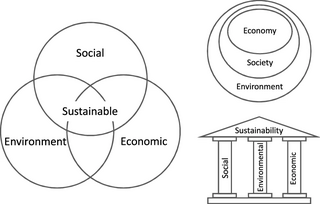Related Research Articles

Ecological economics, bioeconomics, ecolonomy, eco-economics, or ecol-econ is both a transdisciplinary and an interdisciplinary field of academic research addressing the interdependence and coevolution of human economies and natural ecosystems, both intertemporally and spatially. By treating the economy as a subsystem of Earth's larger ecosystem, and by emphasizing the preservation of natural capital, the field of ecological economics is differentiated from environmental economics, which is the mainstream economic analysis of the environment. One survey of German economists found that ecological and environmental economics are different schools of economic thought, with ecological economists emphasizing strong sustainability and rejecting the proposition that physical (human-made) capital can substitute for natural capital.
The green gross domestic product is an index of economic growth with the environmental consequences of that growth factored into a country's conventional GDP. Green GDP monetizes the loss of biodiversity, and accounts for costs caused by climate change. Some environmental experts prefer physical indicators, which may be aggregated to indices such as the "Sustainable Development Index".

Environmental resource management or environmental management is the management of the interaction and impact of human societies on the environment. It is not, as the phrase might suggest, the management of the environment itself. Environmental resources management aims to ensure that ecosystem services are protected and maintained for future human generations, and also maintain ecosystem integrity through considering ethical, economic, and scientific (ecological) variables. Environmental resource management tries to identify factors between meeting needs and protecting resources. It is thus linked to environmental protection, resource management, sustainability, integrated landscape management, natural resource management, fisheries management, forest management, wildlife management, environmental management systems, and others.

Ecosystem services are the various benefits that humans derive from healthy ecosystems. These ecosystems, when functioning well, offer such things as provision of food, natural pollination of crops, clean air and water, decomposition of wastes, or flood control. Ecosystem services are grouped into four broad categories of services. There are provisioning services, such as the production of food and water. Regulating services, such as the control of climate and disease. Supporting services, such as nutrient cycles and oxygen production. And finally there are cultural services, such as spiritual and recreational benefits. Evaluations of ecosystem services may include assigning an economic value to them.

Robert Costanza is an American/Australian ecological economist and Professor at the UCL Institute for Global Prosperity, University College London. He is a Fellow of the Academy of the Social Sciences in Australia and a Full Member of the Club of Rome.
The idea of public ecology has recently emerged in response to increasing disparities over political, social, and environmental concerns. Of particular interest are the processes that generate, evaluate and apply knowledge in political, social, and environmental arenas. Public ecology offers a way of framing sustainability problems, community dynamics and social issues. Forests, watersheds, parks, flora, fauna, air, and water all constitute environmental quality and are therefore public goods. The processes society engages in to negotiate the meaning of these goods, upon which decisions and actions are based, reside within the public domain.
The "Melbourne Principles" for Sustainable Cities are ten short statements on how cities can become more sustainable. They were developed in Melbourne (Australia) on 2 April 2002 during an international Charrette, sponsored by the United Nations Environment Programme (UNEP) and the International Council for Local Environmental Initiatives. Experts at the Charrette were drawn from developing and developed countries.
Public participation, also known as citizen participation or patient and public involvement, is the inclusion of the public in the activities of any organization or project. Public participation is similar to but more inclusive than stakeholder engagement.

Natural resource management (NRM) is the management of natural resources such as land, water, soil, plants and animals, with a particular focus on how management affects the quality of life for both present and future generations (stewardship).
Sustainability metrics and indices are measures of sustainability, using numbers to quantify environmental, social and economic aspects of the world. There are multiple perspectives on how to measure sustainability as there is no universal standard. Intead, different disciplines and international organizations have offered measures or indicators of how to measure the concept.

Sustainability is a social goal for people to co-exist on Earth over a long time. Definitions of this term are disputed and have varied with literature, context, and time. Sustainability usually has three dimensions : environmental, economic, and social. Many definitions emphasize the environmental dimension. This can include addressing key environmental problems, including climate change and biodiversity loss. The idea of sustainability can guide decisions at the global, national, organizational and individual levels. A related concept is that of sustainable development, and the terms are often used to mean the same thing. UNESCO distinguishes the two like this: "Sustainability is often thought of as a long-term goal, while sustainable development refers to the many processes and pathways to achieve it."

Ecosystem management is an approach to natural resource management that aims to ensure the long-term sustainability and persistence of an ecosystem's function and services while meeting socioeconomic, political, and cultural needs. Although indigenous communities have employed sustainable ecosystem management approaches implicitly for millennia, ecosystem management emerged explicitly as a formal concept in the 1990s from a growing appreciation of the complexity of ecosystems and of humans' reliance and influence on natural systems.
Environmental governance (EG) consists of a system of laws, norms, rules, policies and practices that dictate how the board members of an environment related regulatory body should manage and oversee the affairs of any environment related regulatory body which is responsible for ensuring sustainability (sustainable development) and manage all human activities—political, social and economic. Environmental governance includes government, business and civil society, and emphasizes whole system management. To capture this diverse range of elements, environmental governance often employs alternative systems of governance, for example watershed-based management. Obviously, in fact the EG arrangements are very diversed and not at all as inclusive as we could wish them to be.
Recreation resource planning is a rational systematic decision-making process about the future management of recreation resources and recreation opportunities. Recreation planning applies analytical tools to deter our human tendencies to make decisions based on predisposition, bias, inadequate analysis, group-think, insular perspective, resistance to change, and excessive self-confidence. It results in decisions that are more effective, efficient, fair, reasoned, and defensible.
A social-ecological system consists of 'a bio-geo-physical' unit and its associated social actors and institutions. Social-ecological systems are complex and adaptive and delimited by spatial or functional boundaries surrounding particular ecosystems and their context problems.

The commodification of water refers to the process of transforming water, especially freshwater, from a public good into a tradable commodity also known as an economic good. This transformation introduces water to previously unencumbered market forces in the hope of being managed more efficiently as a resource. The commodification of water has increased significantly during the 20th century in parallel with fears over water scarcity and environmental degradation.
Ocean governance is the conduct of the policy, actions and affairs regarding the world's oceans. Within governance, it incorporates the influence of non-state actors, i.e. stakeholders, NGOs and so forth, therefore the state is not the only acting power in policy making. However, ocean governance is complex because much of the ocean is a commons that is not ‘owned’ by any single person or nation/state. There is a belief more strongly in the US than other countries that the “invisible hand” is the best method to determine ocean governance factors. These include factors such as what resources we consume, what price we should pay for them, and how we should use them. The underlying reasoning behind this is the market has to have the desire in order to promote environmental protection, however this is rarely the case. This term is referred to as a market failure. Market failures and government failures are the leading causes of ocean governance complications. As a result, humankind has tended to overexploit marine resources, by treating them as shared resources while not taking equal and collective responsibilities in caring for them.
Traditionally, market orientation (MO) focuses on microenvironment and the functional management of an organisation. However, contemporary organisations have widened their focus to incorporate more roles, functions and emphasis on the macro environment. Firms have been concerned with short run success and often not taken into account the long-run ecological, social and economic effects from their activities. Despite growth in the MO concept, there is still a need to reconceptualise the concept with a greater emphasis on external factors that influence a firm.
Social accounting is the process of communicating the social and environmental effects of organizations' economic actions to particular interest groups within society and to society at large. Social Accounting is different from public interest accounting as well as from critical accounting.
The Landscape Conservation Cooperatives (LCC), established in 2009 in the United States, are a network of 22 regional conservation bodies covering the entire United States and adjacent areas. They are autonomous cooperatives sponsored by the U.S. Department of the Interior and aim to develop coordinated conservation strategies applicable to large areas of land. Partnerships are formed with government and non-government conservation organizations to achieve common goals of conservation. While fairly new as government supported entities, the LCCs are similar to initiatives that have been started or advocated in other countries.
References
- ↑ Costanza, R. et al. 2007. Lisbon principles of sustainable governance. In: Encyclopaedia of Earth. Ed. C. J. Cleveland. Environmental Information Coalition, National Council for Science and the Environment, Washington D.C. Published in Encyclopaedia of the Earth August 9, 2007; retrieved February 6, 2009. Archived January 29, 2009, at the Wayback Machine
- ↑ Costanza, R. et al. 1998. Principles for sustainable governance of the oceans. Science281: 198-199. (also Nature387: 253-260 (1997) see above.)